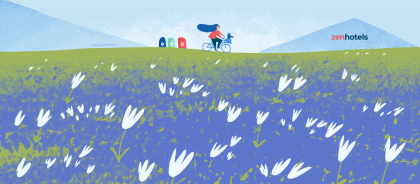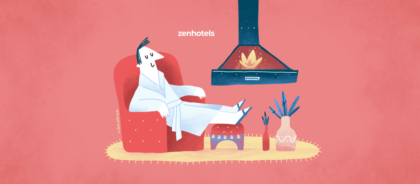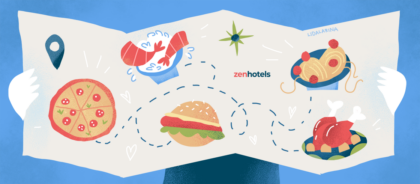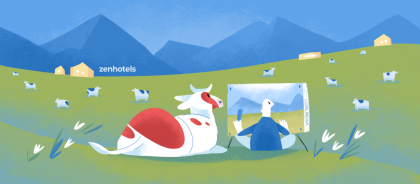Respect and accept
Switzerland was built on the juncture of three cultures — German, French and Italian — yet managed to preserve the special features, architecture and languages of all of them. At the same time, it would be wrong to suggest that the German part is typical Germany or that the Italian part is just like Italy. It is still Switzerland — an entity in itself, yet so diversified and not resembling anything else.
View this post on Instagram
There are four official languages in Switzerland: German (native to 68% of the population), French (23%), Italian (8%) and Romansh (fewer than 1%). But this does not mean that the Swiss know all four of them. In school, one of the national languages is studied as a first foreign language (for example French in the German-speaking part), while English is studied as the second foreign language. And so it’s quite normal for Swiss people from different parts of the country to communicate with each other not in one of the official languages, but in English. That said, the Swiss are highly respectful of each language, though they do have a tendency to make jokes about this matter. There is a view that any friction this causes is smoothed by a sense of national difference from actual Germans, French people and Italians.
The Swiss have had to learn to respect not only different cultures but also different religions. The country has an approximately equal number of Catholics and Protestants. Getting to where they are now involved centuries-long wars, but they eventually came to treating each other’s views with respect.
View this post on Instagram
This is all reflected in day-to-day communication: the Swiss are reserved in giving opinions. You won’t hear sharp, negative, insulting words from them. They don’t insist on their views and, unless asked, won’t give advice to anybody whose viewpoint, personal appearance, opinions or philosophy differ from their own. Nothing but respect and understanding.
Live in harmony with nature
Most Swiss people cannot imagine life without active outdoor pursuits. The unique Alpine countryside facilitates this. Winter is for mountain skiing, snowboarding, sledging, and walking through the mountains in snow shoes. Summer means barbeques with family and friends in the countryside, hiking in the mountains or cycling through them. Sport there is so important that even in the woods in the city outskirts you can find obstacle courses and open-air gyms.
Top 5 hiking routes
For fans of hiking and mountains I’ve put together the 5 most amazingly beautiful routes.
- 5 Seen Wanderung — 5 lakes on Pizol. It’s not just that the lakes are incredibly picturesque, but that you can take a panoramic route along the Tectonic Arena Sardona, a UNESCO World Heritage site. It takes about 4 hours to travel 12 km.
- Stoos — Klingenstock — Fronalpstock — Stoos. A panoramic route with views over the mountains and Lake Vierwaldstätter. 4.5 hours, 15 km.
- Hoher Kasten — Fälensee — Sämtisersee — Brülisau. Views not only of the mountains and lakes, but of the neighboring countries: Lichtenstein, Austria and Germany. 6 hours, 18 km.
- Brienz-Rothorn. A proper locomotive will take you to the summit. Or you can travel to the Planalp midway station and walk the rest of the way: 5.5 km, 2 hours.
- Wilderswil — Schynigge Platte.A train that is over 100 years old will take you to the summit. You can also exit at the Breilauenen midway station and walk the remaining 3.5 km in an 1 hour. The summit contains a botanic garden with Alpine flowers. The best time to admire the beauty is July to August.
People of all ages head for the mountains: pensioners with trekking poles skillfully overtaking everybody else; families with little kids: those able to can toddle along, while babies are carried in special slings. The Swiss learn from an early age which flowers they aren’t allowed to pick, how to behave in the mountains and, above all, that they mustn’t drop litter. Picking up other people’s litter and taking it to the nearest bin is quite normal for them.
View this post on Instagram
Moreover, separating litter isn’t empty words for them. The Swiss separate plastic packaging, aluminum, cardboard, bio-waste and glass. Once a month, the Swiss (those of them who are not lucky enough to have special boxes for paper) engage in their favorite national pastime — they put together Bündeli — perfectly equal mounds of waste paper bound with string. They also have to create separate mounds from cardboard boxes, and it’s important not to forget to pull off all the stickers, otherwise the Swiss will get heart attacks!
The Swiss also treat animals with great love and care. For example, you can go almost anywhere here with dogs, while by law you are forbidden from owning just one guinea pig. You have to take a couple, as these animals are considered sociable and might get lonely on their own. And it’s perfectly in keeping with the Swiss’ spirit to refuse to build a dam if it means destroying somebody’s nest or razing flowers that only grow in this particular valley.
View this post on Instagram
Make provisions for your pension in advance
There is an opinion that all pensions in Europe are high. However, that’s not really true. If you don’t make pension payments for your entire working life and don’t build up savings, then it’s virtually impossible to live in a country as expensive as Switzerland on the minimum pension. Therefore, all Swiss people start to make pension provisions from their very first pay check.
The average pension is 58% of salary. This is with an average monthly salary in the country of around $6,500. Life doesn’t end when you become a pensioner (at 65 for men or 64 for women). On the contrary! Local pensioners have hardly any spare time: they travel, learn foreign languages, go on long walks, or visit clubs catering to their interests. Children and grandchildren need to work hard to fit into their crowded timetables 🙂
Enjoy the food
It’s not normal for the Swiss to jump into a restaurant for a quick snack. Firstly, restaurants and cafes in Switzerland are an expensive habit (the average check for dinner for two is $150—300). Secondly, a restaurant meal or dinner party is an entire ritual.
View this post on Instagram
It begins with an aperitif to work up your appetite. Usually this is a glass of prosecco with nuts or another snack. Then they will offer you fresh bread with butter or olive oil. Only after that can you tuck into the starters: salads and bruschetta. Between the main dish with meat and the starters they often serve a fish dish. A Swiss dessert could be a cheese plate or something sweet. After the meal it’s normal to order an espresso and Schnapps — a shot of strong alcohol to help with digestion. The main rule is not to hurry and to enjoy it.
Love your country
It’s hard to find a Swiss person who doesn’t love their country. For the Swiss, their country is a symbol of reliability, stability, economic success and independence. But for them, being a patriot doesn’t mean blindly adoring their country and closing their eyes to its defects. Rather, patriotism means sincere love and a desire to make their country the best place.
View this post on Instagram
All Swiss people play an active role in their country’s life. Virtually every decision impacting the economy, politics, finance or public life, be it at the federal level or at the level of the local municipality, is made by the local residents. Once every three months the country holds a referendum: a letter is sent by mail to each citizen outlining the initiatives in great detail, with their pros and cons. The Swiss study the material carefully and then vote on it. Moreover, any resident can suggest an initiative in absolutely any walk of life, providing they collect 100,000 signatures.
Although Switzerland is a neutral country, all men are required to serve in the army. From the age of 18 the Swiss regularly join up with the army for three to four weeks at a time until they have served a total of 260 days. Serving in the army is prestigious and honorable, and nobody tries to avoid this important part of everybody’s life.
View this post on Instagram
Respect your own and other people’s time
The life of the Swiss is planned out very nicely and precisely, hour by hour and for a long time to come. They don’t like it when they are not following their plan. It’s considered polite in Switzerland to turn up to meetings not on time, but early. If for some reason the train is three minutes behind schedule, the Swiss start to mutter under their breath and look at their Swiss watch hurriedly. It’s best not to turn up late to a meeting with the Swiss. They are unlikely to say anything about this (their upbringing won’t allow it), but they will come to a conclusion about you.
Living according to a timetable allows them to strictly regulate the opening times of shops, restaurants and various entities. Shops are open until 19:00—20:00, while everything is shut firmly on Sundays. This is done so that the Swiss can spend time with their families and relax after a working week. While Sunday is a quiet day. You mustn’t recycle bottles, hoover, cut the grass or make a noise at all.
View this post on Instagram
Honor and respect traditions
Each year in February and March Swiss cities hold carnivals. The biggest of these is in Basel. It has been held since 1529 and is UNESCO-classified cultural heritage. The carnival lasts three days with around 12,000 people taking part in costumes and over 100,000 visitors! Entry is free, but you have to acquire a plakette — a badge you attach to your clothes. They are different each year and for each carnival.
More festivals!
Switzerland hosts lots of festivals, which have been held since the Middle Ages and are so popular among the locals.
- Alpabzug — the return of the cows from mountain pastures, when the heads of the animals are decorated with flowers and they are brought through the villages accompanied by music and dancing.
- Sechseläuten — the annual spring festival in Zurich, when a snowman is melted in the city’s central square, thus parting with winter.
- Fête des Vignerons — a winemakers festival in the French-speaking town of Vevey has been held every 20 years for the last two centuries. It lasts a month and over 1 million people visit it!
- Chinbäse — an annual parade in the small town of Liestal. 300 people dress up as firemen and carry huge burning “brooms” through the narrow medieval streets. In the 19th century, the town featured a broom factory which produced so many of them that there was nowhere to put them, so they started to burn them and create fun out of the process!
The Swiss are also very protective of their folklore. Alpine folk music has passed down from generation to generation orally, without writing the notes down on paper. The most Swiss musical instrument is the 3.5 meter long alphorn — even today you can hear it frequently in the mountains. Just like yodeling, it’s a special type of singing without words.
View this post on Instagram
The national sport is a type of wrestling called Schwingen and it is very popular in the country. Two wrestlers compete against each other and the person who pins his or her opponent’s shoulders to the ground wins. The competition is held in traditional Swiss costume — a shirt and trousers over which they put on shorts made from jute fibers and the idea is that a player has to throw their opponent to the ground holding on to these shorts. If this was once a pastime of farmers, then today it is becoming popular in the cities. Another national sport is throwing the Ushpunnen stone, an raw boulder weighing 83.5 kg.
View this post on Instagram
What has Switzerland taught me in four years? I won’t be lying if I say that many of my views have changed dramatically. First, it is, of course, concern for the environment. Separating waste is now as natural for me as brushing my teeth. I buy fruit and vegetables from local farmers, and I have learned to understand eco-friendly cosmetics and household products. I have become more relaxed about my appearance: my inner state does not depend on whether I have put on makeup or not, or whether I’m wearing comfortable jeans or an elegant skirt. Oh yes, I haven’t put on heels for a very long time, as you can’t walk on the local paving stones in them.
Switzerland has taught me to enjoy life at the moment, without haste. There is no social pressure here: to complete university as soon as possible, to get married and have children as soon as possible. About 30% of the population gets university education here, since there are no non-prestigious professions. It is also completely normal to switch your profession at 30, 40, or even 50 years old. And they start a family only by the age of 35.
Switzerland also taught me how to plan: to arrange meetings with friends a couple of weeks in advance, not to be late, to buy tickets for concerts six months in advance, to book a restaurant table a month in advance. It’s the slow life again, all unhurried.





